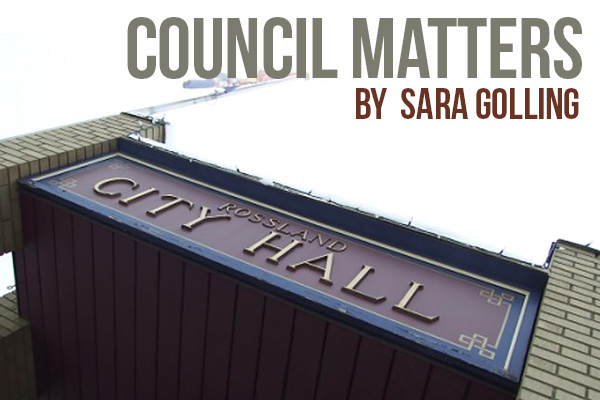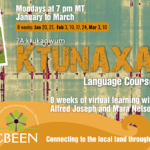Taxes too low? Developmental check-ups for kids; discouraging the use of biocides; and more.
UPDATED with corrections to the FAN presentation — with thanks to FAN for the clarifying information. See below.
Rossland City Council meeting, April 24, 2017: Mayor Kathy Moore and Councillors Lloyd McLellan, John Greene, Andrew Zwicker, Andy Morel, and Marten Kruysse all attended; only Aaron Cosbey was absent.
Public Input Period: Taxes vs. Quality of Life
Janice Nightingale spoke up during Public Input Period. She was concerned that the City keep up or improve its quality of services and attractive amenities, and not focus on lowering taxes — because lowering taxes means lowering levels of service and letting infrastructure deficits build up, as has happened in the past — not only in Rossland, but nation-wide. She was concerned that the tax increases in the 2017 to 2021 financial plan may not be enough to cover the interest charges on the City’s borrowing for infrastructure improvements, according to her analysis; she used an amusing analogy of a widget factory choosing to succeed by continuing to make higher-quality widgets (though they cost a bit more) instead of cheapening its product. She said, “It’s irresponsible to not address the revenue shortfall, and to continue to increase municipal taxes at an artificially low rate.” She pointed out that other nearby communities have raised their taxes by a greater percentage than Rossland over the past several years.
Kruysse asked Nightingale what she would identify as measures of a community’s success that are not financial; she responded that whether the number of homeowners grants claimed had increased or diminished would be the main measure. The number of children in a community was another.
Moore thanked Nightingale for her comments, and responded that the City has managed to reduce its operating expenses by increasing efficiencies and is working hard to balance the need for affordability with the need for a good level of service. She pointed out that, though Rossland’s higher-income residents may not be very concerned about tax increases, there are many residents who struggle financially, and the City doesn’t want to lose them. She also pointed out that the financial plan is up for revision every year.
Delegations:
1. The Audit: Andrea Kramer, of Berg Lehmann Chartered Accountants, spoke about the external audit of the City’s 2016 financial statements. She commented that the auditor’s opinion letter is significantly shorter than in previous years — “short and sweet!” — providing the conclusion that the financial statements present fairly the City’s financial position. She commented that the City is working on its asset management plan, and needs to remain aware of its contaminated sites; Moore said she thought the City was waiting for direction on that from the Province. Moore also commented that Council is very pleased with the quality of information provided by Manager of Finance Elma Hamming; Kruysse added that her work is very clear and readable. He encourages the public to have a look at her summary.
2. Family Action Network and Vulnerable Children:
Christy Anderson and Sonia Tavares spoke about the “Early Development Instrument” (EDI) which is administered by Kindergarten teachers across BC. It’s a “population-level” tool to collect information; for more detail, go to earlylearning.ubc.ca. They also spoke about “Ages and Stages,” administered by FAN — an enjoyable play-based method of giving young children, from birth to age six, a “check-up” to identify any areas where they (and their parents) could benefit from additional knowledge and support, and to connect them to helpful resources. They urge “Check Early, Check Often” and note that there are two centres in Rossland: the Strong Start program, and the Four Winds Childcare Centre.
They noted that the School District 20 “vulnerability rate” is currently 22%, lower than the provincial average of 32%, but higher than some other areas such as Revelstoke, and increasing, which is alarming. They noted that too much “screen time” and too little outdoor physical activity is a problem for many.
FAN aims to reduce our regional percentage of vulnerability by assisting all children and their families, so that children here will be in a better position to get better grades in school, to have better health, self-esteem and social skills, and later in life, to have a better employment record and less likelihood of teen pregnancy, drug use, or involvement in crime.
FAN is seeking financial support from the City of Rossland in the amount of $500. Moore responded that Council will discuss how best to provide that; she wondered if the community support grants were appropriate.
Editor’s Note: A number of studies show that investment in Early Childhood Development pays off many times over in economic benefits: check out the analysis in this Alberta report and in this article from the University of Pennsylvania, or this enlightening July, 2014 opinion piece in the Globe and Mail (which states that, at that time, Canada ranked last in the OECD countries in the percentage of GDP spent on early childhood development).
2016 Financial Statements:
In discussion, Kruysse asked whether there is any opportunity to refinance to obtain lower interest rates on the City’s long-term debt; Hamming answered that, after five years, there’s an opportunity to pay down the balance, but not to renegotiate. Kruysse asked whether Rossland has “light industry” and Chief Administrative Officer Bryan Teasdale responded that the percentage of the City’s tax income from light industry is .11% (point one one percent) in these statements.
The motion to accept the 2016 Financial Statements CARRIED unanimously.
Council received the 2017 Corporate Work Plan for information purposes: a list of actions and projects that are on the City’s “to-do” list, and the progress made on each.
Policy Review:
Pesticide and Herbicide Use Policy
This policy, which formerly restricted the use of biocides only on City-owned land, now applies to private property as well. Staff explained that until the City has enforcement capacity, they suggest the “softer” approach of a policy, rather than a bylaw, aiming to eliminate the use of toxic herbicides and pesticides in the City — except where needed in cases of hazardous invasive species, where the use of toxins is deemed to be less dangerous than the spread of the invasive species.
Morel stated that he wants a firmer position; many communities across Canada have already restricted the use of herbicides and pesticides, and “we’re still pussy-footing around on it.” Moore suggested putting a bylaw in place once the City has the ability to enforce bylaws more effectively. Kruysse thought staff had done “a marvellous job” of amending the policy. Greene thought that Rossland doesn’t need a bylaw, just education; Zwicker thought the revised policy is a “great way to start” addressing the issue.
A motion to adopt the revised policy CARRIED.
Residential Water Conservation Incentive Program Policy
Council noted that the policy is no longer needed, since the City now has water metering. A motion to rescind it CARRIED.
Recreation Facilities User Allocation Policy
A motion to confirm the policy CARRIED. A further motion to refer it to the Arena User Task Force also CARRIED.
Development Variance Permit Application for 1585 Thompson Avenue:
A motion CARRIED to grant variances reducing the front and interior side setbacks needed to place a carport on the property, utilizing the current driveway and fitting the topography.
Financial Plan and Tax Rate Bylaws:
Council passed motions to give second and third readings to the 2017 – 2021 Financial Plan and the 2017 Tax Rate Bylaws. Moore noted that there will be a Public Hearing for both bylaws on Thursday, May 4, at 6:00 pm.
Short-Term Rentals:
During discussion of the Task List, Moore expressed concern that the short-term rentals measures may not be ready in time for the coming winter season, as renters book in advance.
Members’ Reports:
McLellan related his unsuccessful attempt to persuade the RDKB’s East End Services Committee to increase the funding for the Kootenay Columbia Trails Society, to compensate for a new requirement about their financial reporting that will cost KCTS an additional $3,500.
Zwicker reported on the Museum’s activities and plans; its grand opening is planned for July 4th, with a whole “Canada Week” celebration, and a “soft” opening a couple of weeks earlier. He also reported that on Earth Day, Rosslanders bought 476 trees, while the entire City of Vancouver sold about 500.He said the Chicken and Compost Crawl was a great success too.
Kruysse presented a written report on Tourism Rossland. He reported that Jackie Drysdale had given an interesting talk pointing out the increasingly competitive nature of tourism, and suggesting that Rossland can make use of our colourful history and heritage in our tourism “offering.”
The Broken Goat footrace, scheduled for July 15, 2017, already had 280 registrants at the time of the meeting. The “Singletrack 6” event on July 29 has over 250 entrants already.
He noted that the cost of running the Free Ride Bus service amounted to $4.21 per ride, or about $87,000 to run the bus each year.
Greene reported that he will be leading the Metal Tech Alley tour in Rossland on May 24.
Moore congratulated Teasdale on having survived a whole year as Rossland’s CAO, and noted that Council will be doing a performance review for him. She also noted that she is very disappointed that the “Regional” Canada 150 celebration will be held on July 1, the same day that local communities all have their own Canada Day celebrations. She thought that date wastes an opportunity for the Lower Columbia communities to work together for a truly regional celebration of Canada 150.
Moore also noted that the Association of Kootenay Boundary Local Governments conference begins in Rossland on April 26, and that there will be 110 voting delegates, and 180 people attending some of the events.
The meeting recessed to an in camera session, under Community Charter section 90(1)(e). And your reporter walked home, amazed at how bright the evening was, and contemplating the importance to human society as a whole of giving children the healthiest possible start in life; and recalling feelings of utter outrage when our BC government, in 2014, clawed back all child support payments made to mothers on welfare — making child poverty worse until they reversed the policy in the fall of 2015 after much public protest. (A number of studies over the years have shown detrimental effects of poverty on children’s brain development.)

























